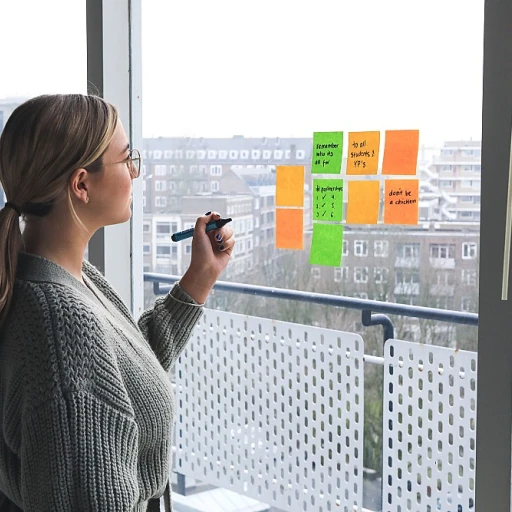
Understanding the Future Work Landscape
Exploring the Transformative Work Environment
The future of work is an ever-evolving landscape, driven by rapid advancements in technology and shifting social dynamics. As businesses and individuals adapt to this change, understanding the new work environment becomes essential. The digital age is transforming how we perceive jobs; traditional roles are evolving, demanding new skillsets for success. This transformation requires a blend of innovative skills and strong leadership.
True confidence in these times can be cultivated by recognizing how societal changes impact job structures and availability. Leadership and effective decision making are more important now than ever. Individuals must feel competent, able to manage teams, and accept the dar ing challenge of daring leadership to help guide others.
Social media and body language play influential roles in building a grounded sense of confidence. People must remember to trust in their ability to adapt to the evolving work environment. By understanding the nuances of the future skills landscape, one can stay positive, develop grounded confidence, and effectively manage negative thoughts that often accompany imposter syndrome.
While leaders may feel overwhelmed, realizing the power of life-long learning and adaptability is key. It empowers individuals to step outside their comfort zone and tackle new job challenges with poise and skill confidence. As organizations emphasize mental health awareness, the right initiatives help team members feel supported and strong. By enhancing problem-solving capabilities and engaging in continuous personal development, a workforce can not only survive but thrive in the future-oriented work scene.
Essential Skills for the Future
Connecting Skills with Future Opportunities
Understanding the essential skills needed for the future is vital for staying ahead in an ever-evolving work landscape. As automation and digitalization continue to reshape industries, the demand for specific skills is rising. To feel confident in navigating this new world, individuals need to cultivate both soft and hard skills that align with emerging trends and opportunities. Soft skills like leadership, problem solving, and emotional intelligence remain crucial. They help in building strong, trusting relationships with team members and enable effective decision making under pressure. Meanwhile, adaptability and resilience are equally important as they allow people to thrive in changing environments. On the technical side, digital literacy, data analytics, and coding are becoming increasingly important. Engaging in continuous learning and staying updated with the latest technological advancements will build confidence in handling new challenges. This approach ensures personal development and preparedness for the work of tomorrow. To dive deeper into the nuances of skill enhancement, explore our detailed insights on enhancing skills for tomorrow's workforce. It emphasizes the importance of lifelong learning and developing a robust set of skills that foster true confidence in one's professional journey. Building confidence is about stepping out of the comfort zone and embracing daring leadership. Whether it's through public speaking, tackling new responsibilities, or enhancing one's body language, every step taken towards self-improvement adds weight to grounded confidence. It's essential to combat imposter syndrome with positive self-reflection and mental health practices while cultivating a style that emanates genuine confidence.Building Grounded Confidence
Establishing True Confidence for Future Success
In the rapidly evolving job market, being able to build confidence is becoming just as crucial as acquiring new skills. Confidence is often the foundation of strong leadership and effective teamwork, allowing individuals to feel assertive while making decisions and taking on leadership roles. Building confidence, however, requires a grounded approach that focuses on personal development and addressing the challenges posed by imposter syndrome and negative thoughts.One significant step towards nurturing true confidence is through self-awareness and understanding the weight of one's own value in the workplace. Acknowledging strengths and areas for improvement allows individuals to work within their comfort zone while gradually pushing beyond it. This balanced approach helps people to effectively manage stress and maintain positive mental health, which is essential for sustaining confidence over time.
Incorporating positive habits into daily routines can also enhance confidence. Engaging in practices such as public speaking, decision making exercises, and problem solving can build the capacity to perform under pressure. Furthermore, adopting power-posing and cultivating open body language can influence how individuals feel confident, thereby assisting them in exuding assurance and trust both in personal and professional interactions.
Social media offers unique opportunities for learning and experimentation where individuals can practice their skills and style in a relatively low-stakes environment. While it's necessary to handle its impacts judiciously to avoid negative comparisons, using social media mindfully can boost skill confidence and contribute to daring leadership by embracing a broader audience.
In essence, cultivating this grounded confidence prepares individuals for demanding roles where they are required to lead, innovate, and influence others. As we continue to explore and adapt to the changes in the future of work, confidence will remain an indispensable element of a successful and fulfilling career path. For more insights on how essential skills and leadership traits are shaping the future workforce, read Unveiling the Future of Work: Key Insights for Tomorrow's Workforce.
Integrating Technology and Human Skills
Blending Technology with Human Innovation
In today's rapidly evolving work environment, understanding how to integrate technology effectively with human skills is imperative. As automation and artificial intelligence (AI) continue to redefine job roles, it becomes increasingly vital to recognize the importance of human elements like creativity, leadership, and emotional intelligence in conjunction with technical expertise.
Technological tools can certainly facilitate efficiency and productivity, but it is the uniquely human skills that allow employees to add new dimensions to their roles. Skills such as problem-solving, decision making, and the ability to operate within a team cannot be replicated by machines. Therefore, pairing these attributes with technological proficiency fosters an adaptable and resilient workforce.
Building confidence to navigate this hybrid landscape requires time and dedication. Engaging in continuous learning to develop both hard and soft skills can enhance one's confidence and prepare them to meet future challenges head-on. Moreover, understanding the psychological aspects, such as overcoming negative thoughts and imposter syndrome, can help in maintaining grounded confidence.
Furthermore, the importance of communication skills in this digital age cannot be overstated. The ability to convey ideas effectively through digital platforms, including social media, is essential for cultivating a strong online presence and establishing trust among peers and team members.
Together, these elements create a robust foundation for personal and professional growth. By integrating technology and human ingenuity, individuals not only build confidence but also develop a style of work that is dynamic and forward-thinking, ready to face the uncertainties and opportunities of tomorrow's workforce.
Lifelong Learning and Adaptability
Nurturing a Versatile Mindset
In today's rapidly evolving work environment, the ability to adapt and learn continuously has become indispensable. The pace of work transformations demands individuals to maintain not just a robust skill set but also a mindset that embraces change. Lifelong learning isn't merely about acquiring new skills; it is about developing a framework of strong mental resilience and flexibility that allows us to thrive in various work settings.
Confidence plays a crucial role in this journey. When you feel confident in your abilities, you are more likely to engage in daring leadership roles, participate in decision making, and confront challenges like imposter syndrome and negative thoughts. It's essential, therefore, to build confidence through practical experiences and continuous personal development. Techniques like public speaking, and role-playing with team members can significantly enhance your comfort zone, allowing true confidence to emerge over time.
Social media and other online platforms have made it easier than ever to access a wealth of learning resources. These platforms provide diverse opportunities for people to trust their paths and find learning materials tailored to their personal and professional style. However, navigating these resources requires discernment and focused attention to avoid the overwhelming "weight" of information overload.
- Integrate learning into daily life: Allocate time regularly for learning, whether through online courses, webinars, or industry news.
- Practice mindfulness: Foster mental health by being aware of your feelings and thoughts, which can build confidence effectively.
- Enhance soft skills: Skills like problem-solving, body language sensitivity, and team collaboration are equally important as technical skills.
Remember, the shifting work landscape isn't something to fear but to engage with positively. As a team, building grounded confidence collaboratively will fortify your ability and desire to tackle any changes on the horizon, ensuring you remain at the forefront of innovation and leadership.
Practical Steps to Skill and Confidence Development
Effective Steps to Cultivate Skills and Confidence
To thrive in the future work landscape, it's crucial for individuals to steadily cultivate their skills while simultaneously building a strong sense of confidence. Here's how you can seamlessly weave these elements into your personal development journey:- Identify Your Skill Gaps: Begin by assessing where your skills currently stand and pinpoint areas that need improvement. The world of work demands agility; hence, recognizing these gaps will enable you to focus your learning efforts effectively.
- Set Clear, Attainable Goals: Goal setting is a pivotal part of skill development. Break down your objectives into manageable tasks, making sure they are specific and time-bound. Achieving these smaller goals will not only enhance your skills but also build confidence through visible progress.
- Dive into Continuous Learning: Embrace a lifelong learning approach, which is key to maintaining a competitive edge in the workplace. Explore diverse learning styles, including online courses, workshops, and even informal peer interactions to continually update your knowledge base.
- Practice Daring Leadership: Leadership isn't just about guiding others; it's about daring to lead yourself. Apply critical thinking and decision-making skills in your daily life to strengthen your leadership abilities. The more you lead by example, the more trust and confidence you build among your team members.
- Embrace Technology Wisely: As technology continues to reshape industries, integrating tech skills into your repertoire is essential. However, don't let the weight of social media and constant connectivity affect your mental health. Use technology as a tool to enhance human connections and problem-solving, rather than as a replacement.
- Face Imposter Syndrome Head-On: Many people struggle with doubts about their competence despite evident accomplishments. To combat this, actively remind yourself of your achievements and practice positive reinforcement. Grounded confidence arises when you acknowledge your successes and learn from setbacks.
- Cultivate Strong Communication Skills: Authentic communication fosters trust and collaboration. Enhance your verbal and non-verbal communication, such as body language and public speaking skills, to ensure your message is both clear and impactful.
- Step Out of Your Comfort Zone: Growth doesn’t occur in comfort. Engage in new experiences and challenges that push you beyond your limits. As you explore unknown territories, your confidence will grow, paving the way for even more daring leadership and innovative thinking.
- Build a Support Network: Surround yourself with a positive team who can provide feedback, encouragement, and mentorship. This network acts as a foundation of support, offering perspectives that bolster your problem-solving abilities and grounded confidence.
- Reflect and Adjust: Regular reflection on your efforts allows you to identify what’s working and what needs change. Monitor your progress and adapt your strategies as necessary, ensuring you're on the right path to both skill and confidence enhancement.













